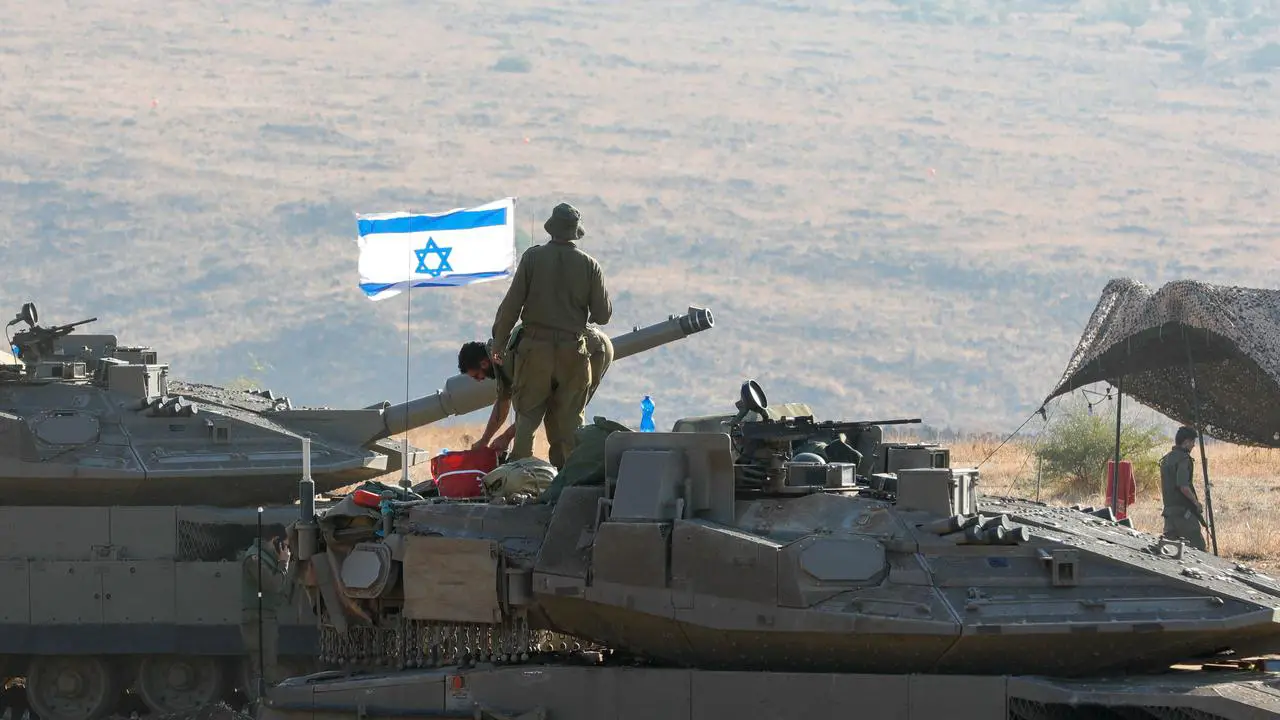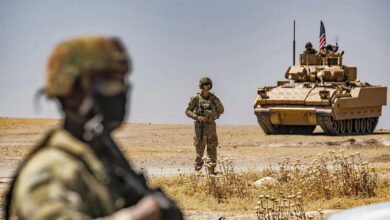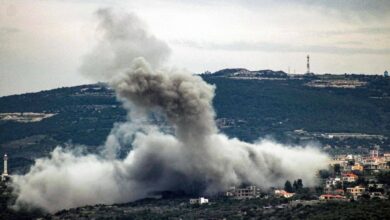Israeli Tanks in Overnight Gaza Raid Ahead of ‘Next Stage’
Israel said Thursday that a column of tanks and infantry had launched an overnight raid into Hamas-controlled Gaza, striking “numerous” targets before retreating to home soil.
The military announced the incursion into the north of the Palestinian territory hours after Prime Minister Benjamin Netanyahu declared preparations for a ground war were underway.
The Israel Defense Forces described the operation as a “targeted raid” that hit “numerous terrorist cells, infrastructure and anti-tank missile launch posts.”
It said the operation was “preparation for the next stages of combat,” adding that “the soldiers have since exited the area and returned to Israeli territory.”
Black-and-white video footage posted by the military showed a column of armored vehicles and bulldozers winding toward what appeared to be a border fence and breaking through it.
AFP verified the location as south of the Israeli city of Ashkelon but could not verify when the footage was recorded.
In preparation for the next stages of combat, the IDF operated in northern Gaza.
IDF tanks & infantry struck numerous terrorist cells, infrastructure and anti-tank missile launch posts.
The soldiers have since exited the area and returned to Israeli territory. pic.twitter.com/oMdSDR84rU
— Israel Defense Forces (@IDF) October 26, 2023
Another video appeared to show an airstrike and later buildings being struck with munitions, sending debris flying high into the air, along with a thick plume of smoke.
Just hours earlier, Netanyahu had delivered a nationally televised address to Israelis still grieving and furious after Hamas’ bloody October 7 attacks, telling them “we are in the midst of a campaign for our existence.”
The shock attack saw throngs of Hamas gunmen pour from Gaza into Israel, killing 1,400 people, mostly civilians, and kidnapping 222 more, according to official tallies.
Israel has retaliated with heavy bombing that Gaza’s Hamas-run health ministry said has killed more than 6,500, with the toll expected to rise substantially if tens of thousands of Israeli troops massed near Gaza move in.
‘Raining Down Hellfire’
Netanyahu, in the face of ever-louder international calls to temper the ferocious bombing campaign, vowed to press ahead with plans for a ground war.
Boasting of “raining down hellfire on Hamas” and killing “thousands of terrorists,” Netanyahu said his war cabinet and the military would determine the timing of a “ground offensive.”
He pledged to “eliminate Hamas” and “bring our captives home” but stressed that “I will not detail when, how or how many” forces would take part.
The ground raid into Gaza was not the first of its kind, a spokesman for the military told AFP. But it was likely to raise tensions in an already anxious region.
US President Joe Biden is among the foreign leaders stepping up public calls for Israel to “protect innocent civilians” and to follow the “laws of war” as it pursues Hamas targets.
Biden on Wednesday said he had privately suggested Israel should get hostages out if possible before any ground invasion.
“It’s their decision, but I did not demand it,” Biden said, as he called on Congress to allocate more money for Israeli defense.
Speaking in Cairo, French President Emmanuel Macron warned: “A massive intervention that would put civilian lives at risk would be an error.”
‘It’s a Massacre’
Gaza’s Hamas-controlled health ministry on Wednesday said the death toll had surged by about 700 in a day to above 6,500, including many children.
US President Biden has stated he has “no confidence” in the Hamas ministry figures.
While the exact death toll may be unclear, the depth of the suffering is not in question.
Entire neighborhoods have been razed, surgeons in hospitals overwhelmed with wounded carry out procedures without anesthetic, and ice cream trucks have become makeshift morgues.
“They’re not waging war on Hamas, they’re waging war on children,” charged one resident, Abu Ali Zaarab, after his family home was bombed in the southern town of Rafah. “It’s a massacre.”
About 1.4 million people — more than half of Gaza’s population — have been displaced, according to the United Nations.
The UN says 12 of the territory’s 35 hospitals have closed due to damage or insufficient fuel, and a key UN aid agency serving almost 600,000 Palestinians said it “began to significantly reduce its operations.”
Israel has cut off Gaza’s normal supply corridors for water, food, and other necessities, and fewer than 70 relief trucks have entered the impoverished territory since the war began.
None contained fuel, which Israel fears Hamas will use for rockets and explosives.
Aid agencies have warned that more people will die if medical equipment, water desalination plants, and ambulances stop operating because of a lack of fuel.
Once the generators stop, hospitals will “turn into morgues,” the Red Cross has warned. Hospitals are also struggling with a shortage of medicines and equipment.
“We performed a number of surgeries without anaesthetic,” said Ahmad Abdul Hadi, an orthopedic surgeon working at Nasser Hospital in Khan Yunis.
“It’s tough and painful, but with the lack of resources, what can we do?”
A Regional ‘Explosion’
The war has sparked fears of a regional conflagration if it draws in more of Israel’s enemies.
Since October 7, Israel has launched thousands of strikes in Gaza, but it has also hit targets in Lebanon and Syria.
Late Wednesday, Lebanon-based Hezbollah fired what Israel said was a surface-to-air missile at an Israeli drone.
Israel’s military said it had intercepted the missile and “struck the source of the launch.”
Hamas, Hezbollah, and Syria’s government are backed by Iran, which denies Israel’s right to exist.
Tehran’s top diplomat on Wednesday accused Israel of carrying out “genocide” in Gaza.
Jordan’s King Abdullah became the latest leader to warn that ongoing violence could “lead to an explosion” in the region.
His wife Queen Rania accused Western leaders of a “glaring double standard” for not condemning Israel’s killing of Palestinian civilians in its bombardment of Gaza.
Violence has also risen sharply in the occupied West Bank, where health officials said more than 100 Palestinians had been killed, mostly in raids by Israeli troops or in clashes with Israeli settlers.












